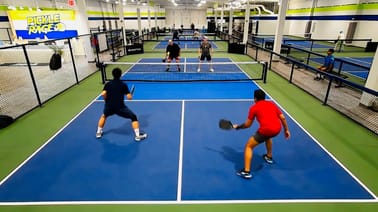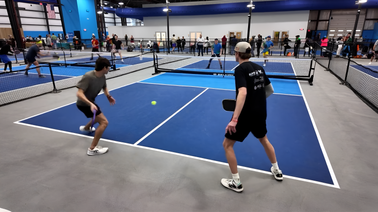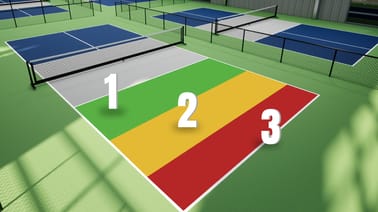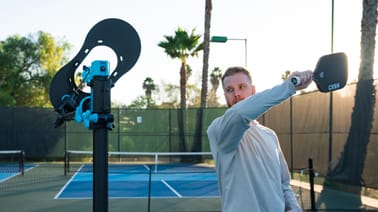
Staying 'Zen' in Pickleball: Improving Your Focus and Decision-Making
In my opinion, pickleball is a game of chess, while tennis is a game of checkers.
Once you master the stroke mechanics of pickleball, then the challenge is to master the mental game. That is where the fun begins.
I have been a pickleball instructor now for four years. And I do focus on the mechanics of the game when I teach. But I go beyond that to teach the mental aspect of the game, which separates the good players from the excellent players.
When I play in tournaments or recreationally, I often receive comments like ‘how can you be so calm on the court’ or ‘you make this game look effortless’. A current theme in sports psychology uses the term ‘mindfulness’.
A common problem in pickleball
We’ve all done it. You’re focused on the ball in a dink rally. Short dinks, deeper dinks to back them up. Back and forth, back and forth.
Then, here it comes: a high ball to your forehand. Your eyes widen. Your heartbeat increases. Your anticipation grows. This is your chance to end the point.
You take a swing at the ball and...you hit it into the net. Arrrggghh. How could you have done this?
You were so focused in the dink rally. So mindful of watching the ball hit the center of your paddle every time.
But when the kill shot you wanted arrived, you blew it. The calm with which you were dinking was no longer there. Your anticipation gave you some anxiety, and you rushed the shot.
Anxiety often gets the best of us when we play:
- We rush our approach to the net on our return of serve, only to see our return fly one foot beyond the baseline.
- We rush our serve only to see it go into the net.
Unforced errors are the difference between winning and losing. And our unforced errors are often caused by rushing our shot.
Make calls before contact
We are constantly making decisions on every shot. Just like in a chess match, we are trying to outsmart our opponents.
As such, we need concentration and a plan before we make our next move.
For example, we often look up to see where our opponents are as we take our swing. We often change our minds as we are hitting the ball. It is critical to make all the important decisions before you strike the ball.
As your opponent strikes the ball, you and your partner must decide who will take the shot when it arrives on your side of the net. Communicate with each other as the ball comes over the net.
Once it’s been decided that you will take the shot, look at your opponent’s position:
- Decide where your shot will go
- How hard will you hit it?
- Will it be a dink, a drop shot, a hard ground stroke, a lob?
- Down the middle?
- Down the sideline?
A lot to decide. But make the decisions before you strike the ball.
Once the decisions are made, don’t change your mind mid-stroke. Watch the ball hit your paddle. Don’t watch your opponents until after contact is made.
Calming yourself on the pickleball court
If you can make these decisions and execute these shots with a calm mind, a focused mind, then you will become more successful.
This is what many athletes call ‘being in the zone’. I call it the Zen of pickleball.
No tension. No hurried actions. No anxiety. Just a calm sense of confidence that we are making the correct decision and the correct shot every time.
Of course, attainment of this state of calm is not easy. Being tense is easy. Being relaxed is difficult.
How do we remain calm in the heat of battle?
Taking some deep breaths can help. There is much energy inside the body waiting to be released during a pickleball game.
Between points, take a few deep breaths and let the tension flow out of your body. You might look at the clouds in the sky or the surrounding hills, trees, and flowers. Or you might take a two-second meditation.
Close your eyes and affirm that “I am calm.” Let these moments relax your mind. Stay in the zone and be in that Zen state of mind.
Mike Leigh lives in Colorado where he teaches pickleball in the Summers and skiing in the Winters. Prior to that, Mike spent 30 years working with elite athletes to improve their performance. Mike also taught tennis for many years, but once he found pickleball about six years ago, he put away the tennis rackets and now exclusively plays and teaches pickleball. Mike’s new book, ‘Zen and the Art of Pickleball’, focuses on the mental game of pickleball.
Be the most informed person in your picklesquad. Our weekly newsletter covers everything from improvement tips to the pro scene and everything in between:









